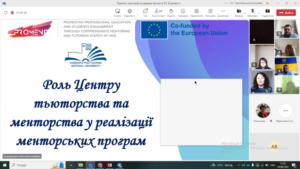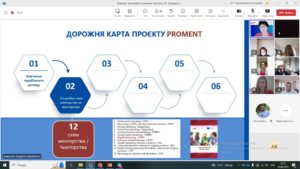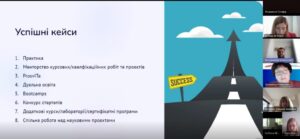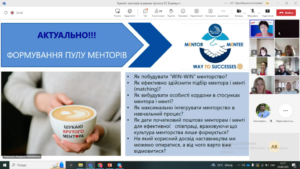June 21, 2024
Results of the Training for mentors within the EU ERASMUS+ PROMENT project
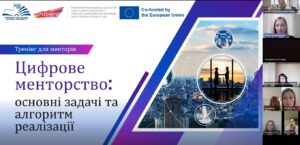
Results of the Training for mentors within the EU ERASMUS+ PROMENT project
On June 20, on the basis of Chernihiv Polytechnic National University and the Chernihiv IT cluster, the Training for mentors was successfully held as part of the EU ERASMUS+ PROMENT project “Promotion of professional education and active participation of students through the establishment of a comprehensive system of mentoring and tutoring in higher education institutions”. The event gathered a large number of participants interested in the development of professional education and mentoring of students.
During the training, Lyudmila Remniova, the institutional coordinator of the PROMENT project, spoke in detail about the main tasks of the international project and its impact on the development of the mentoring system at the university. She singled out a number of problematic issues that must be resolved for the active introduction of mentoring into the practice of educational activities at the university: how to build “WIN-WIN” mentoring; how to effectively select a mentor and a mentee (matching); how to build personal boundaries in the mentor-mentee relationship; how to maximally integrate mentoring into the educational process; how to give an initial impetus to mentors and mentees for effective cooperation, given that the culture of mentoring is only just being formed; what useful mentoring experience we can rely on, and what should be abandoned.
The head of the Tutoring and Mentoring Center of Chernihiv Polytechnic National University, Alla Kholodnytska, focused on the role and main functions of the center headed by her in forming a pool of mentors and effective implementation of mentoring programs, and also presented existing forms of cooperation with employers in this direction.
Anna Verbytska, deputy head of the Tutoring and Mentoring Center of Chernihiv Polytechnic National University, revealed the key aspects of digital mentoring and algorithms for its implementation. Taking into account that this particular mentoring scheme will be piloted at the university in 2024, the speaker informed the participants of the training with the results of a survey of higher education applicants regarding the need for the formation of digital skills and convenient formats of interaction during mentoring sessions.
Volodymyr Bazylevych, the coordinator of the development of digital mentoring at the university, held an interesting session on the techniques of group and individual work of a mentor with a mentee, and also shared successful cases of mentoring in the preparation of higher education applicants in the field of IT. Conclusions and a discussion on the modern role of a mentor ended the event on a high note, giving the participants the opportunity to share their vision of mentoring problems and, in the course of active networking, actualize the acquired knowledge.
The participants of the Mentor Training received certificates and left the event with new knowledge and motivation for further cooperation in the implementation of mentoring programs.
Many thanks to everyone who participated in this important event!
Together, we make a significant contribution to the development of professional education and support of mentoring programs at the university.
Mentorship is a reliable investment of time and experience in the future of our country. See you soon!
All intellectual property rights belong to members of the PROMENT consortium and are protected by current legislation. Reproduction is prohibited without prior written consent. All members of the PROMENT consortium have agreed to full publication of this information. The PROMENT project is funded under the ERASMUS+ Program of the European Union under grant agreement 101082696. This publication reflects only the point of view of the members of the PROMENT consortium, and the European Commission is not responsible for any use that may be made of the information contained in the publication
